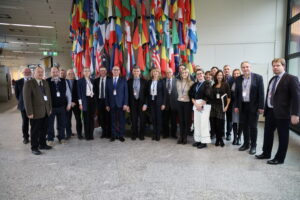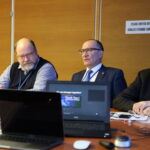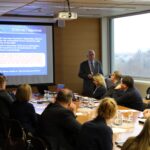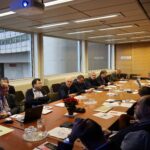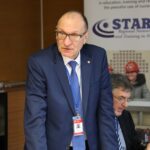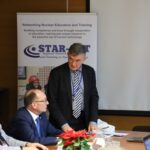The V General Assembly of the Regional Network for Education and Training in Nuclear Technologies – STAR-NET was held on 9-13 December 2019 in Vienna, Austria, with the support of the International Atomic Energy Agency (IAEA). 26 representatives of eight member universities from Armenia, Belarus, Kazakhstan, Poland, Russia and the IAEA took part in the event dedicated to summarizing the work of the network and approving plans for the next year.
David Drury, Head of the IAEA Nuclear Knowledge Management Section, addressed the participants with a welcome speech. Emphasizing the role of university education programmes and regional cooperation in the long-term development of qualified personnel for the nuclear industry, he noted the successful cooperation of the STAR-NET network with the IAEA aimed at developing coordinated approaches in nuclear education and implementing specific projects.
Rector of the National Research Nuclear University MEPhI (NRNU MEPhI), Russia, and President of the STAR-NET network, M.N. Strykhanov, highly appreciated what had been done and identified new tasks that needed to be solved in order to create a common educational space within the network.
Representatives of member-universities presented the experience gained by universities in solving the problems of education and professional training of specialists for the nuclear industry. Many universities have established cooperation with leading enterprises on the basis of which this work is carried out, international exchange of students and teachers is practiced, and textbooks related to education in the field of nuclear technology are being prepared. Based on the results of the discussion of the submitted proposals, the participants approved the work plan for 2020. The special attention was paid to the need to launch joint research projects involving young employees and graduate students.
V General Assembly has elected the network’s governing bodies for the next two years. Rector of the NRNU MEPhI M.N. Strikhanov has been elected as the President of the STAR-NET network and A.I. Timoshchenko, Head of the Department of Nuclear Physics of the Belarusian State University – as the Vice-President.
Members of the Presidium have been elected as follows: V.Z. Marukhyan, rector of the National Polytechnic University of Armenia; M.A. Ramazanov, Dean of the Physics faculty of Baku State University, Republic of Azerbaijan; V.A. Bogush, rector of the Belarusian State University of Informatics and Radioelectronics; K.Sh. Zhumadilov, Head of the Department of Nuclear Physics and New Materials and Technologies of the L.N. Gumilyov Eurasian National University, Republic of Kazakhstan; M. Oittingen, Associate Professor of the Energy and Fuel faculty of the AGN University of Science and Technology (AGH-UST), Poland; S. M. Dmitriev, rector of the Nizhny Novgorod State Technical University n.a. R.E.Alekseev, Russia; and V. P. Kravchenko, Director of the Educational and Methodological Center for Nuclear Energy of the Odessa National Polytechnic University, Ukraine.
A.L. Burov, representative of the Belarusian National Technical University, Republic of Belarus and A.E. Khrobostov from the Nizhny Novgorod State Technical University n.a. R.E.Alekseev have been elected as the STAR-NET auditors.
The meeting participants visited the TRIGA research nuclear reactor at Atominstitut of the Technical University of Vienna, which is the base reactor for internships of nuclear students from STAR-NET universities.
The Regional Network for Education and Training in Nuclear Technology (STAR-NET) has been founded in September 2015 to promote, manage and preserve nuclear knowledge and to ensure the continued availability of talented and qualified human resources in the nuclear field in the countries, which educational organizations participate in this network, and to enhance the quality of the human resources for safe and sustainable use of nuclear technology. Currently the STAR-NET unites 15 universities from 8 countries: Armenia, Azerbaijan, Belarus, Kazakhstan, Poland, Russia, Uzbekistan and Ukraine.
